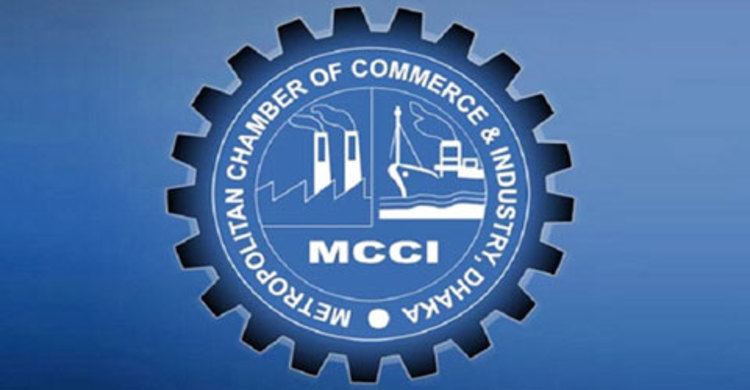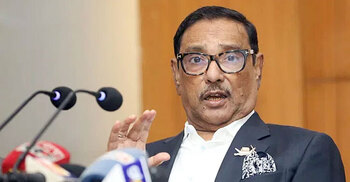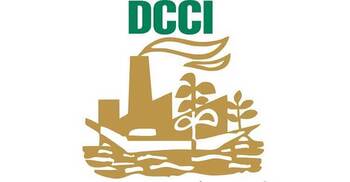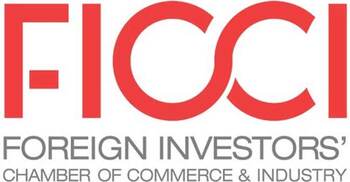Implementing budget 2024-25 highly challenging task: MCCI

Metropolitan Chamber of Commerce and Industry, Dhaka (MCCI) has congratulated Finance Minister Abul Hassan Mahmood Ali, MP, for presenting the 53rd National Budget for the financial year 2024-2025 in the National Parliament on Thursday (June 6).
MCCI believes that given the contraction of the export market caused by inflation, a sluggish investment system, high interest rates for bank loans, as well as the ongoing Palestine-Israel and Ukraine-Russia hostilities, the finance minister faced a daunting task in preparing the budget while simultaneously implementing the Smart Bangladesh framework and advancing Bangladesh’s status as a developing country by 2026.
The proposed budget for the fiscal year 2024-2025 stands at Tk 797,000 crore, which is 4.62 percent higher than the original budget (Tk 761,785 crore) and 11.56 percent more than the revised budget (Tk 714,418 crore) of the current fiscal year. The proposed budget is 14.24 percent of GDP.
The government has allocated an amount of Tk 265,000 crore in the Annual Development Program (ADP) for the upcoming fiscal year to speed up economic recovery. By keeping the industrial sector active through ongoing stimulus programs and keeping the poverty rate low through social protection programs, the budget has set an inflation target of 6.5 percent and GDP growth of 6.75 percent.
Considering the present economic landscape, the National Board of Revenue (NBR) has increased the revenue collection goal by 11.63 percent. The target for the forthcoming fiscal year 2024-2025 has been set at Tk 480,000 crore, signifying a rise from the previous target of Tk 430,000 crore for the fiscal year 2023-24. In the fiscal year 2024-25, the VAT authorities’ collection target will be Tk 182,783 crore, the Income Tax authorities’ Tk 175,620 crore, and the Customs authorities’ Tk 121,597 crore.
Implementing the budget in the present context is a highly challenging task. Nonetheless, for the budget to be effectively executed, the chamber opines that there are further prospects to optimize the management of the budget, reform tax policies, automate the tax system, reduce system loss in overall tax collection, enhance tax administration capacity, and deliver adequate services to the public.
MCCI has consistently recommended significant structural reforms in tax administration to enhance effective revenue collection. In the present framework, a considerable number of qualified entities with high income remain outside the scope of taxation. On the other hand, there is a growing imposition of tax burden on individuals and businesses who fulfill their tax obligations regularly. MCCI strongly emphasizes the need for a proper resolution of the matter.
The estimated budget deficit for the fiscal year 2024-2025 is Tk 256,000 crore, representing 4.6 percent of GDP. Out of this total deficit, Tk 95,100 crore will be funded through external sources, while Tk 160,900 crore will be sourced internally. Out of this Tk 160,900 crore, Tk 137,500 crore will be obtained from the banking sector, while Tk 23,400 crore will be sourced from savings certificates and other non-banking financial institutions.
The final budget deficit is likely to widen because of ongoing tax reform conditions imposed by the International Monetary Fund (IMF). Under the IMF loan conditions, the tax-GDP ratio is expected to rise by 0.5 percent to 8.8 percent, potentially increasing the tax burden on taxpayers. Therefore, MCCI advises the implementation of effective financial management practices to limit expenditure on government projects.
The government borrowing target from the banking system is Tk. 137,500 crore, which is 11.82 percent higher than the revised budget of Tk. 155,935 crore for the fiscal year 2023-2024. There are two borrowing scenarios that the government might confront. First, a rise in credit supply by the banking system has the potential to have a crowding out effect on the economy, resulting in a shortage of funds for private sector investors. In addition, borrowing from the central bank by the government contributes to an increase in inflationary pressure, thereby placing the burden on either the consumer or the public. Consequently, MCCI prioritizes the need for seamless coordination between these two aspects. MCCI is also apprehensive about the potential impact of increasing inflation on future business expansion.
The Chamber holds the view that the budget for the fiscal year 2024-2025 should concentrate on pro-poor and inclusive growth. It is crucial to increase the support given to the needy through the social safety net significantly. The allocation for social safety net in the proposed budget is Tk. 136,026 crore, which was Tk.126,272 crore in FY 2023-24. This sector has experienced a Tk. 9,754 crore (7.72 percent) increase only. MCCI deems it imperative to increase the allocation for this sector judiciously.
MCCI believes that economic growth continues to face significant obstacles because of underdeveloped communication systems, infrastructure, and bureaucratic complexities. Also, weak revenue collection system (70.6 percent collected between July-April of the current fiscal year) and implementation of the ADP (49.3 percent implemented during July-April of the current fiscal year) are a cause of concern for the economy. Additionally, in light of the escalating import trend and the current global crisis, it is crucial to implement precautionary measures in foreign exchange expenditure for maintaining macroeconomic stability. The excessive subsidies on electricity, gas, and fertilizer prices need to be regulated. Otherwise, MCCI feels the subsidy cost could further increase significantly.
MCCI applauds the decision to reduce the corporate tax rate by 2.5 percent for unlisted companies and one-person companies. However, MCCI is proposing a decrease in this rate for other listed companies as well. In light of this, MCCI foresees companies being motivated to comply with tax payments. However, MCCI expresses its disappointment regarding the absence of any proposed amendments to the terms of cash transactions pertaining to the corporate tax rate. Given that the informal economy makes up approximately 80 percent of Bangladesh, such terms and conditions are not compatible. On the other hand, the Chamber suggests reducing the rate of Tax Deduction at Source (TDS) on services that create employment, like construction, infrastructure, etc. Moreover, the effective tax rate in Bangladesh is very high. Therefore, the Chamber is emphasizing the need for a prompt initiative to reduce the effective tax rate by streamlining permissible business expenses and TDS rates.
Presently, the cost of living is steadily increasing because of inflation. MCCI humbly requests a reevaluation of the proposal to increase the tax rate from 25% to 30% without changing the current tax-free income limit for individual taxpayers. The Chamber believes that simply raising the tax rate for current taxpayers without expanding the number of taxpayers or the tax net will not accomplish the desired tax-GDP ratio.
MCCI has consistently advocated that imposing a minimum tax on company turnover is contrary to the established tax policy. Therefore, it is imperative that it be removed. In the event of a business generating profit, the tax should only be imposed on the taxable income and not on the revenue or any other funds.
The world is witnessing a persistent surge in commodity prices and inflation. On the other hand, the government faces a formidable challenge in expanding the tax net and increasing the tax-GDP ratio. MCCI believes in the need for digitalizing the tax system and ensuring that tax policies are user-friendly and simple in order to achieve optimal revenue collection.
MCCI believes that ensuring adequate supply of Electronic Fiscal Devices (EFDs) for VAT will speed up the overall VAT collection process. Furthermore, it suggests the prompt automation of the entire VAT system and the sufficient availability of EFDs. In the current context, the Chamber feels that it is necessary to increase the VAT net and bring all eligible establishments under the umbrella of VAT. Given the observable prevalence of the informal economy in our nation, a thorough examination is essential to determine the practicality of involving third-party entities for VAT collection. Nonetheless, it is essential to offer necessary briefing, training, and guidance to third-party VAT collectors, with ample transparency, to prevent any deterioration in the relationship between VAT payers and recipients. MCCI is disappointed that there are no significant suggestions for structural reform of the VAT Act (as per the original VAT Act, 2012).
MCCI appreciates the proposed provision of 10% instead of 20% deposit of tax claimed in appeals before the Appellate Commissionerate and the Appellate Tribunal in light of Value Added Tax and Supplementary Duty Act, 2012 and Value Added Tax and Supplementary Duty Rules, 2016.
The Chamber is of the opinion that the effective automation of the VAT system, specifically through the integration of the Integrated VAT Administration System (IVAS) and Application Programming Interface (API), will significantly improve its efficiency. This will help ensure more VAT collection and bring more establishments under VAT. Also, MCCI is strongly proposing: 1) the elimination of the input-output coefficient, 2) easing the limitation of rebate on inputs, and 3) reducing the scope of exemption of VAT at source.
The Chamber expresses concern that the proposed increase in supplementary duty rates on imported goods could lead to an upward trend in the cost of living. The high prices of commodities have presented a difficult predicament for individuals of limited means or low incomes. In the current fiscal year (2023-2024), the inflation target was set at 7.5 percent. A target of 6.5 percent has been set for the inflation rate in the next financial year, 2024-2025. However, in May of the fiscal year 2023-2024, the inflation rate reached 9.89 percent. Consequently, the inflation rate has remained above 9 percent for 14 consecutive months. Given the present circumstances, MCCI holds the view that the current inflation target is not realistic.
MCCI praises the government for extending the tax exemption on Information Technology Enabled Services (ITES) till June 30, 2027. Based on the latest data, the annual domestic turnover in the ITES sector is estimated to be approximately USD 1.5 billion, with exports reaching around USD 1.9 billion. The current investment in this sector stands at approximately USD 600 billion.
MCCI, in alignment with climate change goals, welcomes the proposal to reduce tariffs on electric and hybrid vehicles. It is to be noted that the environmental surcharge applies in case of use of more than one motor vehicle by company/establishment. However, it is not applicable to conventional buses and trucks, i.e. the main polluting vehicles. In relation to this matter, the chamber suggests that company vehicles should be exempt from this surcharge. Simultaneously, a designated policy is necessary to regulate the proper disposal of used batteries in the context of electric vehicles.
MCCI expresses strong concern about the opportunity to whiten undeclared money (black money) by paying only 15 percent tax. This arrangement will discourage regular, law-abiding taxpayers. It can be perceived as a penalty for taxpayers who comply with their obligations regularly. MCCI believes that introducing penalty provisions, along with imposing tax at the maximum rate, will serve as an encouragement for regular tax payers.
MCCI expresses gratitude to all parties involved in the enactment of the new Customs Act, 2023, in Bangla language, as a measure to facilitate ease of doing business. Bangladesh’s import-dependent economy will experience improved trade conditions through the implementation of the Customs Act, 2023. MCCI holds the belief that this Act has the potential to enhance the ease of doing business, while also ensuring compliance with WTO obligations and fostering a favorable environment for businesses. However, the legal system has embraced a stringent stance in imposing penalties. The Customs Act, 2023, places great emphasis on the use of automation. MCCI is of the opinion that the utilization of scanners in the goods release process will enhance the convenience of conducting business. The Chamber recommends the prompt publication of the English translation of this Act to facilitate its efficient implementation.
The MCCI acknowledges the National Budget Proposal’s focus on “Cashless Bangladesh,” “Digital Bank and Credit Scoring System,” and “Digital Land Management” as pivotal elements for advancing towards a Smart Bangladesh, which, in turn, will advance automation.
Under normal circumstances, the budget implementation should be subject to periodic monitoring and evaluation. Considering the prevailing global economic crisis, it is crucial to undertake an assessment of budget implementation. As a result, MCCI believes it is essential to undertake an interim evaluation of the budget every three (3) months. If necessary, the budget can be revised and modified accordingly. Also, addressing issues that have consequences for both society and the economy might be necessary.
MCCI will, as always, continue to offer its guidance and assistance in the ongoing economic and social development of the country. -Press Release-





